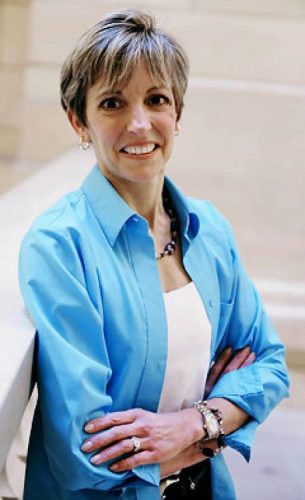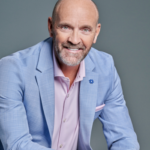Trisha Meili

A Story of Hope and Possibility
Topic Categories:
Fee Range: Contact Speaker Exchange Agency
Trisha Meili’s story is about the capacity of the human body and spirit to heal. It is a story of hope and possibility. It didn’t begin that way. Today, Trisha speaks to groups, including businesses, universities, brain injury associations, sexual assault centers and hospitals, about her journey of recovery and healing.
*Fee ranges are presented as a guideline only. Speaker fees are subject to change without notice. For an exact quote, please contact your Speaker Exchange Agency representative.
Trisha Meili’s story is about the capacity of the human body and spirit to heal. It is a story of hope and possibility. It didn’t begin that way.
On April 19, 1989, Trisha went for a run in New York’s Central Park shortly after 9 PM. Hours later, two men wandering the park found her near death from a brutal beating and rape. In a coma, with 80 percent blood loss, a traumatic brain injury and severe exposure, doctors at Metropolitan Hospital worried that this young woman might not survive. The story seized the headlines, not only in New York City, but also around the world as people contemplated what the savagery of the attack said about our society.
Trisha, known to the world as The Central Park Jogger, revealed her amazing story of survival and recovery fourteen years later in her best-selling memoir “I AM THE CENTRAL PARK JOGGER: A Story of Hope and Possibility.”
Born in northern New Jersey, raised there and in Pittsburgh, Trisha was a Phi Beta Kappa economics major at Wellesley College and a double graduate degree recipient (MBA and MA) at Yale University. After graduation, she went on to work as an associate at the Wall Street Investment Bank Salomon Brothers, until her life was violently interrupted that terrible night in Central Park. Amazing her doctors and colleagues, Trisha returned to Salomon eight months after the attack, became a Vice President and continued her career there for another eight years. She then ran a nonprofit in New York City, The Bridge Fund of New York Inc., before writing her story.
I AM THE CENTRAL PARK JOGGER is not a story of an attack, but rather, one of healing. The horror of her attack brought an outpouring of support and love from her family, friends, healthcare workers, co-workers and strangers. Trisha credits this support as part of the miracle of her recovery as she relearned how to do simple things, such as rolling over, telling time, buttoning her blouse or identifying simple objects. The support allowed her to move from victim to survivor, reclaim her life and become whole.
Trisha gives her time to organizations vital to her healing: As an advocate trainer for the Sexual Assault and Violence Intervention Program (SAVI) at Mount Sinai Hospital, as an Honorary Officer on the Board of Directors of Gaylord Hospital where she did much of her rehabilitation, and as Founding Chairman of the Board of Achilles International that helped her run the New York City Marathon in 1995.
Trisha was the recipient of the Leadership Award from the National Center for Victims of Crime, the National Courage Award from the Courage Center, the Pacesetter Award from New York Hospital Queens, the Spirit of Achievement Award from Albert Einstein College of Medicine, the Courage Award from Boston’s Magic 106.7 Radio Exceptional Women Program and an Olympic Torchbearer in New York City.
Trisha has appeared on numerous television shows including a Katie Couric Special, The Today Show, Dateline NBC, Larry King Live, The CBS Early Show, CNN and FOX News.
Today, Trisha speaks to groups, including businesses, universities, brain injury associations, sexual assault centers and hospitals, about her journey of recovery and healing. She also gives workshops on transforming adversity. With her work, book and lectures, she offers lessons on how to manage through unpredictable change, whether personal, professional economic or spiritual. Her story has encouraged people worldwide to overcome life’s obstacles – regardless of what they might be – and get back on the road to life.
Trisha stresses how outside support was vital to her healing. Family, friends, coworkers, doctors, nurses, and therapists all worked as a team to ensure Trisha’s survival. Additional support came from strangers as an outpouring of thoughts, prayers, and warm messages provided a critical connection for Trisha, reaffirming that she was not alone in her ordeal. Trisha inspires others about the importance of “joining the team,” regardless of the goal.
Self-knowledge is a critical element in any leadership practice. After the attack, Trisha was forced to learn to live in a new body with a new mind, to understand herself in an entirely new way. Becoming more acutely aware of her strengths and weaknesses helped Trisha develop confidence, which lead to setting goals and taking action to improve. Trisha encourages others to tap into the power of self-knowledge, take control and move forward.
Trisha couldn’t change what happened – the attack – but she realized that she could choose how to respond. Beyond her recovery, Trisha chose to use this adversity to offer hope and possibility to others. In everyday life, we make choices quite causally, even carelessly. But when people choose consciously and with precision – choose as though their life depends on the choice they are making, real power flows. Through her speaking and writing, Trisha inspires listeners to experience the power of making conscious choices.
Trisha’s transformation from someone in a wheelchair, who couldn’t walk to once again being a determined athlete capable of completing a New York City Marathon, was the result of concentrating on her possibilities. Focusing on what she could do, rather than on what she couldn’t, motivated her to keep pushing to the edges of what she thought was possible, regardless of the obstacles. As a best selling author and Chairman of a worldwide organization serving those with disabilities, Trisha shows the results of continued pushing and growing.
In the middle of a crisis, it is often difficult to figure out what to do first. When everything had been taken away from Trisha, she realized all she could do to improve her future was to work in the present moment. She offers this as critical insight to all of us who face business and personal challenges.
In the darkest days after the attack, Trisha took responsibility for her recovery, realizing that she was an integral part of the healing process. Soon after emerging from the coma when a nurse asked her, “Who’s the captain of this ship?” Trisha replied, “I am.” Taking responsibility in this way led Trisha to set, pursue and achieve goals, and touch thousands in the process. Trisha demonstrates to her audience that taking personal responsibility is the beginning of peak performance.
Want to bring Trisha Meili to your next event? Please tell us a little about your event, and we will get back to you shortly!




